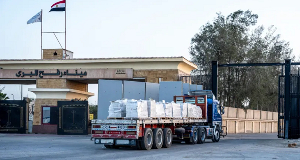A Case Of Another Dutch Disease ?
Ghana’s quest to discover and produce hydrocarbon predates independent Ghana, but actual commercial find happened probably a century after. Hydrocarbons has been seen as a panacea to many a country’s economic quagmire, that once a country discovers the black gold, all its economic woes are resolved.
Such was the pageantry that characterized the announcement of the discovery in commercial quantities by the Jubilee partners off Cape Three Points Ghana’s sweet crude when samples displaced in a plate was presented to His Excellency the then President John Agyekum Kufuor in 2007. The joy of the entire executive at the time could not hidden and it immediately set the tone for political discuss, with the opposition National Democratic Congress calling the whole display a hoax, citing similar pronouncement by the late R.R. Amponsah under the Dr. K.A. Busia’s progress party.
In all these celebrations, we forgot entirely to situate the oil find in the existing marine biota and its significance for the domestic and national economy. As a country we have neglected the sector so much, even civil society with socialistic biases have landed themselves in the capitalistic debate of revenue and and private sector influence. Civil society focus is driven and directed by donor interest, much to the neglect of the fisheries and related sectors.
GHANA’S FISHERIES SECTOR:
According to records available at the Fisheries Commission, the fisheries sector of Ghana contributes 4.5% to GDP, employs 10% of Ghanaians directly and indirectly, provides over 65% to animal protein and in fiscal terms contributes $1billion annually.
The sector is divided into marine and inland (fresh) water, with the marine coastal stretch from Half Asini in the Western Region to Aflao in the Volta Region, with over 300 landing beaches and the inland sector mostly constituted of the Volta Lake and other riverine in Ghana.
In the marine sector, there are the Industrial (Trawl and Tuna), Semi-Industrial (inshore) and Marine Artisanal (canoe) whiles the inland sector has mostly artisanal fishing interest with a growing aqua-culture mostly in the Volta Lake.
The fisheries sector is well capitalized with huge investments, for instance with an estimated 12, 000 canoes, at a cost of GhS50,000 and over 200 inshore vessels with an estimated cost of GhS30,000 huge investments in the industrial trawl and tune sectors, one will gape in awe at the levels of investment that has been made in the marine fisheries sector.
Ghana fisheries sector is regulated by laws both local and international aimed at sustainable exploitation of the resource which is a shared resource due to the fact that movement of fish is not restricted to artificial boundaries of countries. Human activities within the marine environment can have pervasive impact on the waters outside the supposed marine territories of the country where the activity takes place. A case in point is the algae bloom that continually creates problems of fishermen in the western Region of Ghana, though the algae bloom is believed to be as a result of industrial activity in La Cote d’voire.
Some of the international laws and policies that guide the marine activities in the world include the United Nations Convention on the Laws of the Sea (UNCLOS) which also defines marine economic territories and FAO code of responsible fisheries. Beyond the UN itself FAO there is also the International Maritime Organization, International Convention on the Conservation of Atlantic Tuna (ICCAT) and many regional and sub-regional bodies working concertedly to protect, the marine environment and the living and non-living things within.
In Ghana, the constitution in article 269 made fisheries a natural resource, in consonance with international practice and established the Fisheries Commission. By the definition of the fisheries as natural resource, fisheries is therefore entrusted in the Presidency and its exploitation, management and protection becomes the responsibility of H.E the President of the Republic through his appointed agents.
Article 269 further mandates parliament to enact a law to establish the functioning structures of the Commission, a law which was enacted in 2002, Act 625 with regulation, Fisheries Regulation 2010 (LI 1968) was passed by parliament in August 2010 and became effective on 3rd August 2010. As part of the collection of the regulatory systems in the industry, the fisheries and aqua culture policy was initiated by the previous government and finalized by the current government. In compliance to the requirement of the Act 625, the fisheries and aqua-cultural development plan was also developed and consulted on with all major stakeholders by this government and a International Development Agency (IDA) and World Bank facility of US$53.8million had been approved by parliament to implement the 5yrs project.
All this efforts and institutional development is aimed just at ensuring the sustainable exploitation of Ghana’s fisheries resources which must not by the stretch of any imagination be subjected to any form of destruction.
OIL VS FISH:
Though it’s not been openly admitted, Ghana’s fisheries is in serious quagmire, competing for survival in the wake of the love and preference of oil over fish, with state institutions and politicians alike, breaking every single law just to allow oil triumph over our fishery. It all started when all the oil exploration companies with impunity totally disregarded this provision in the Act 625 section 93 captioned FISHERIES IMPACT ASSESSMENT.
“ 1) A person or government departments or other agency planning to conduct any activity other than fishing, which is likely to have a substantial impact on the fishery resources or other aquatic resources of Ghana, shall inform the Commission (FISHERIES-mine) of the plans prior to the commencement of the planned activity with the view to the conservation and protection of the resources
2) The commission may make or require reports and recommendations by those conducting the planned activity regarding the likely impact of the activity on the fishery resources or other aquatic resources of Ghana and possible means of minimizing adverse impacts, which shall be taken into accounts by persons, government department or agency in the planning of the activity and in the development of the means of preventing or minimizing the adverse impacts.
3) The requirement under this section shall be in addition to any other requirements of the Environmental Protection Agency”
The provision did not subject the FIA under the belly of the Environment Impact Assessment EIA which is purely a requirement under the EIA regulation 1999, a law that predates the Act 625 of 2002. The supervising agency of the FIA is also not EPA but the Fisheries Commission, which is why it is not acceptable for the Jubilee Partners to claim that their hurriedly prepared EIA, which will not pass in any serious country is so copiously conducted, it completely integrates fisheries impact.
That position falls flat in the face of the provision in section 93. 1-3 and this impunity must stop. It needed to be acknowledged that the competencies required for the total analysis may not all be available at the EPA and that is why the two requirements must be handled separately with some coordination.
The fisheries sector requires a lot of expertise, apart from fisheries scientist, there are fisheries economist, statistician and a lot more experts that work with and for the commission. At least Kwame Nkrumah University of Science and Technology (KNUST), University of Ghana and the University of Cape Coast have departments with research biases for fisheries and marine science.
To ignore this section of the Act 625 and assume wrongly that EPAs requirement under EIA regulation 1999 is enough to manage the oil impact on fisheries is very unfortunate. These therefore begs the argument that the so called integrated EIA conducted by the Tullow led Jubilee partners, for which we are experiencing destructive impacts on fish landing was enough to cover impact on fisheries.
The provision requires that the commission is informed, and by my understanding of informing a statutory body such as the EPA, one has to follow due diligence and provide a copiously written out document stating all major activity and then availing ones competencies for discussion with the commission. Unfortunately, in the entire discussion from the planning, seismic activities, test drilling, mounting of rigs and actual drilling and laying of pipelines, the Fisheries Commission was not informed nor involved in any decision making process.
Even in the process of the collection of data to form baseline for analysis, the commission and its departments were not properly involved and only an historical data rather than a trend data was used.
When Kosmos spilled the mud in 2010, we had a huge challenge as a country holding them to the impact because we do not as a country consider the Fisheries Act as part of the set of laws governing the entire natural resource sector. It was obvious there were damages to the fishery however we refused to consider that impact of that damage to the fishery. Besides the competent body by Act 625 to deal with the issue according to section 92 (2) of Act 625 should be the Fisheries Commission.
There has been many cases when pollution of fisheries habitat and its damage to the fishery has been handled exclusively by the Environmental Protection Agency. These issues go just beyond EPA because the Fisheries Commission is suppose to be a competent body constituted by law with departments and units to effectively measure impact. If as a state we have not tooled THE COMMISSION well enough then the time is now. Section 92, of the Act 625 titled Pollution of Fishery Waters;
92. “A person who directly or indirectly introduces a deleterious substances into the fishery waters which adversely affects the habitat or health of the fish or other living aquatic resources commits an offence and is liable on summary conviction to a fine of not less than
1) $50,000 and not more than $2million where a local industrial or semi-industrial or a foreign fishing vessel is used in the commission of the offence or
2) 50 penalty units and not more than 500 penalty unit in any other case and the person may be ordered by the court to pay such additional amount as the court may determine in compensation for any loss suffered as a result of the of the introduction of the deleterious substances and any related cleanup cost”.
It is therefore worrying that when Kosmos spilled the mud we could not identify issues through this section of the Act 625 to demand some reparation to do damage control in the fisheries sector.
PROTECTION OF THE FISHERY FROM OUR IMPACT;
It is a sad commentary observing how frantic efforts are made to protect oil facilities from fishermen denying them access to places considered sensitive oil areas. Much as it is important to protect investment as well as life and properties, the rights of others to sustained livelihood must not be at the opportunity cost.
Beyond the Section 93 which seeks to ensure that minimal damage is done to the marine biodiversity by activities unrelated to fishery, section 91 also places responsibility on the Fisheries Commission to advice the Minister on which areas should be marine reserves, thus excluding those areas from not just fishing related activities but any activity that can be impact on the fisheries.
MARINE RESERVE:
91. (1)The Minister may on the advice of the Commission and, and after consultation with the Minister for the Environment, owners of the adjoining land and the relevant District Assembly declare any area of the fishery waters and the seabed underlining the waters to be a marine reserve.
In countries such as Australia and Norway, the protection of marine species and fishery is as important as any other economic activity including oil and will not open up their Exclusive Economic Zone (EEZ) the way we have opened up ours for extraction without putting in place the relevant laws and institutional architecture to ensure that the natural environment is not unnecessarily disturbed.
They all have marine reserves that are well protected and very sensitive areas in the sea are not open up for seismic activities just because we are interested in few millions of dollars from oil revenue.
Whereas some other Ministers who have no relation to the protection of the marine biodiversity are taken advantage of some provisions to declare areas as oil sensitive areas and as preventing fishing and related activities, those that have the responsibility to protect the living organism in the sea seem to have gone to sleep, palpably exposing our marine species to grave danger of extinction.
CONCLUSION:
The fish and other marine species are hugely important to the sustenance of the country’s economy and they remain livelihood and by extension human rights issues . The right holders, espe cially the right to work in a safe and dignified environment have on many occasions been violated. The clarion call to have them protected against the predation of the oil companies is so very relevant. There are other issues regarding sea use contestation and between oil related interest and fishery related interest.
These issues linked to the attempts to make fisheries secondary to oil and probably try to have the sector collapsed either consciously or unconsciously for which activities such as destruction of fishing gears, protection of oil rigs at the detriment of fishing without ensuring safe passage for fishing interest, activities of the navy and seizure of fishing gears among others.
? Early Warning Signals Ignored
By 2008, the entire electioneering campaign was themed around oil revenue and its management and how that would be used to turn Ghana’s economy around. Experts were called to the boardroom to develop policies and roadmaps with committees being formed all over.
Oil management paradigm was developed and completely centred on revenue management with Ghana declaring itself a net exporter of crude oil.
Educational institutions already existing started introducing programmes on oil and gas with new ones mushrooming with the main academic focus on oil and gas related programmes. People in the Western Region have expectations seriously raised expecting to maximize benefit from the discovery of hydrocarbons off the coast of their region, hoping to fill in the gap where Gold, Cocoa, Timber and many other natural resources they have in abundance failed to grow their region.
Civil society organizations redirected focus and migrated their head office from Tamale to Takoradi, which now becomes the hub, and proposals for funds moved from advocating for the rights of the vulnerable and reintegrating “kaya yee” into the system to either policing government use of oil revenue to engaging policy on oil revenue management.
Presidential debate focused mostly on oil revenue management and Presidential candidates promised unbelievable things with oil revenue when elected. Ghana was about oil revenue in 2007-2008. Is that all that oil is about, was what some of us paused to ask. Did we get the fundamentals right, and what are the impacts since we were all talking about the goodies.
We need our fish to survive.
BY RICHSTER NII AMARH AMARFIO
EXECUTIVE SECRETARY CORPORATE SOCIAL RESPONSIBILITY MOVEMENT (CSRM) AND CO-CONVENER CSOS ALLIANCE ON FISHERIES AGNEDA, FOUNDING MEMBER COALITION ON HUMAN RIGHTS IN OIL AND GAS (CHROG)
Amarfio_2001a@yahoo.co.uk or Richster@revitalization.org
www.revitalization.org/csrm
Mob: +233-(0)204-292163
Opinions of Sunday, 22 April 2012
Columnist: Amarfio, Richster Nii Amarh














